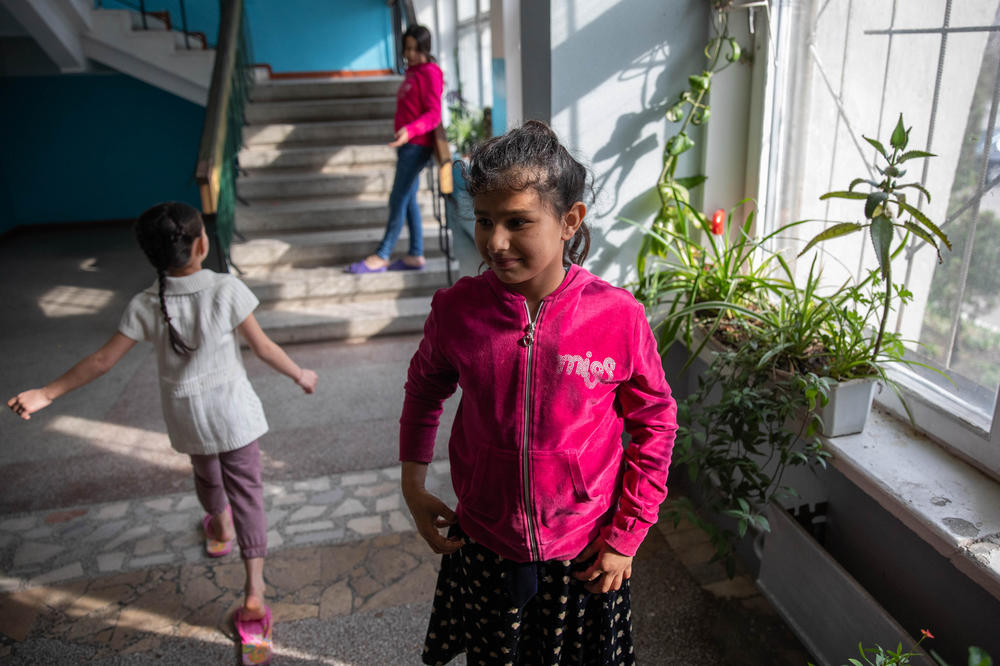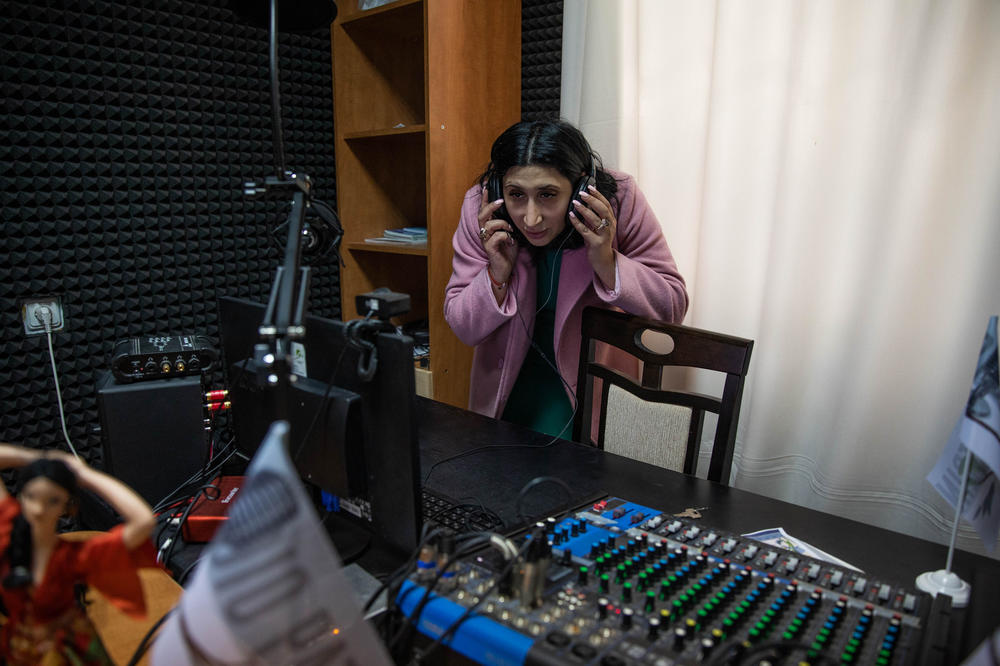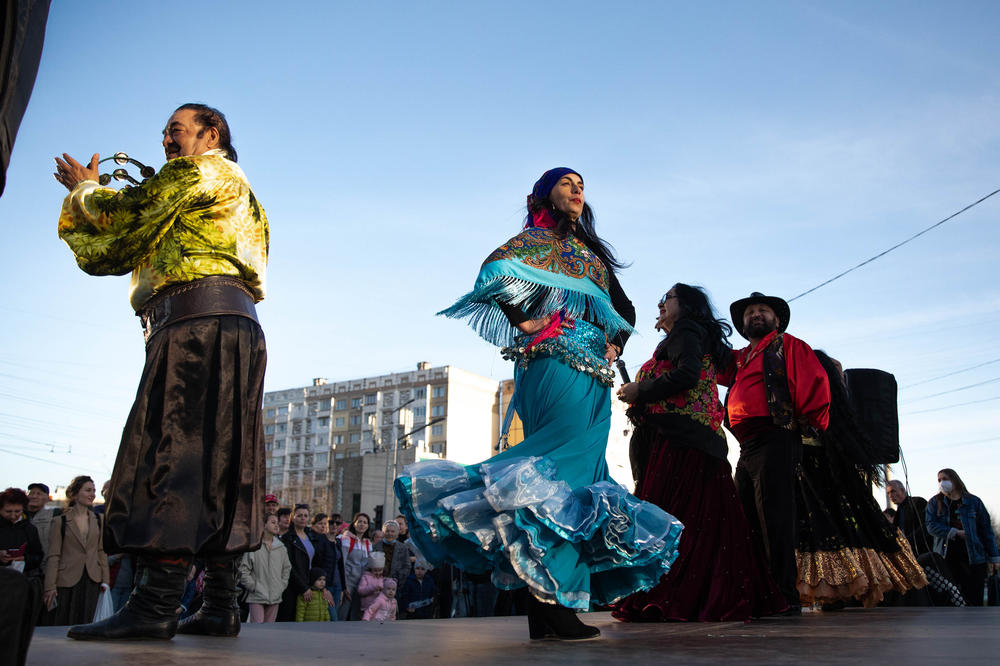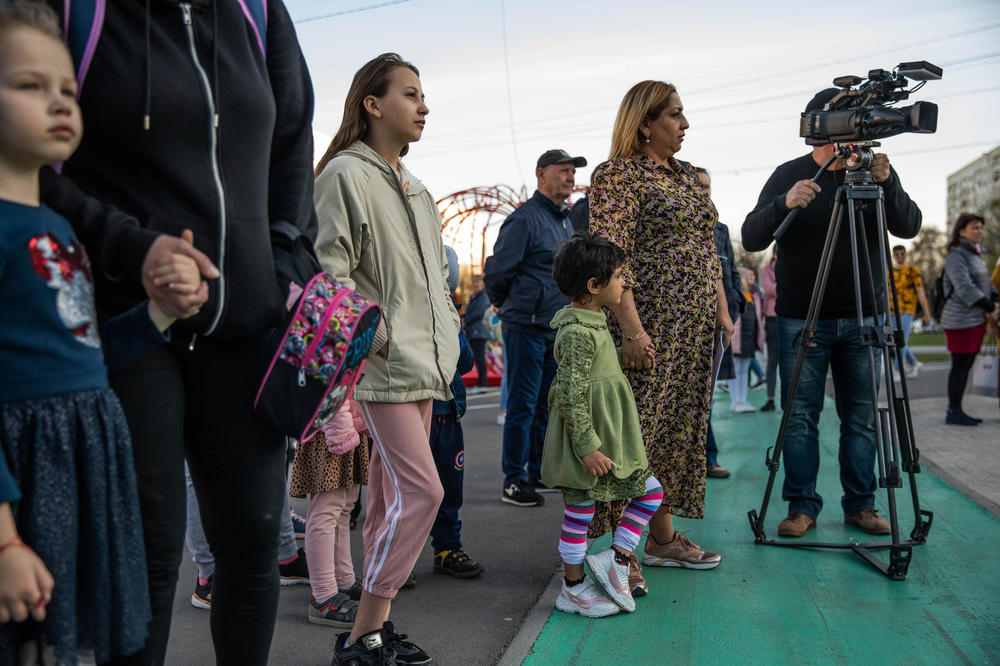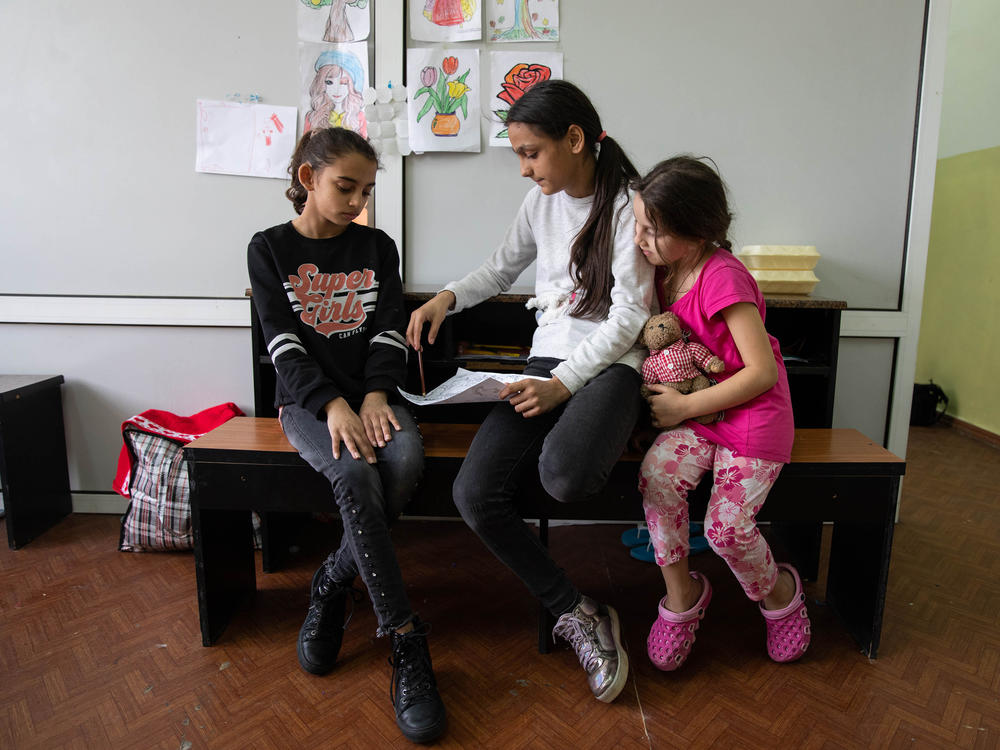Section Branding
Header Content
Roma refugees who fled from Ukraine to Moldova are now in limbo
Primary Content
CHISINAU, Moldova — Angelina Leonidovna Kovach decided to leave the Ukrainian city Kharkiv in the second week of March, emerging from her basement refuge into a country under fire. She crossed from Ukraine into neighboring Moldova with a group of her relatives — all members of Ukraine's Roma minority.
Now, in a university building turned temporary refugee center in Moldova's capital Chisinau, Kovach and other Roma are in limbo. Entire families live together in classrooms emptied of desks to make space for beds. Mothers find a quiet corner to feed their babies while older children fill time by playing card games in the hallway.
People who have travel documents can leave for other countries in Europe and beyond. People who don't cannot. Kovach, 35, doesn't have her passport — it got left back in Ukraine in the rush to evacuate.
When Russia launched its invasion of Ukraine in late February, she was visiting family in Kharkiv, in the north, and decided it was best to leave directly instead of traveling back to her home in Zaporizhzhia, in the southeast, to claim her documents. "For two weeks there was bombing," she says. "I was afraid to go [back]."
In the early days of Ukraine's war, undocumented people were able to pass through Moldova's borders easily, either via official crossing points or unfenced sections of the border. This made the country the most logical place for people to flee if they didn't have passports, and word of this option spread among communities where this was common.
Members of Ukraine's Roma minority, an estimated 400,000 people, are among the more than 6 million refugees who fled Ukraine since the war began. For many people from this ethnic group, crossing borders is complicated because they have no way to prove their nationality. "Most of the Roma are stateless," says Victorina Luca, a human rights lawyer and founder of Radio Patrin Moldova, a Chisinau radio program geared to the Roma community.
Stateless and stranded
Statelessness for Roma people is a multifaceted issue. Following the dissolution of the Soviet Union, Roma communities in the region have been forcibly displaced by numerous conflicts. When new states were formed, people in the Roma minority lacked the required primary documentation to prove their birthplace and connection to the places where they were applying for nationality, which left them unable to claim citizenship there.
That statelessness is often inherited since undocumented parents face obstacles when registering their children in the country where they live. Some Roma have only birth certificates or passports left over from Soviet times. Others have no documents at all.
"It's partly systemic problems that plague people in poverty. It's partly the intricacies of Ukraine and [its] history," says Jonathan Lee, advocacy and communications manager at the European Roma Rights Centre, a human rights organization in Brussels. But on the ground, issues of statelessness are exacerbated by hostility toward Roma people at the registrar's office, he says. "That's the main obstacle day to day for getting IDs."
According to the United Nations refugee agency, the number of Roma people who are stateless or at risk of statelessness who remain in Ukraine is unknown. It's also unknown exactly how many have left Ukraine to seek protection elsewhere.
Efforts to help a uniquely vulnerable refugee community
In Moldova, the number of refugees before the war started was small. Last year, there were 405 refugees and 3,372 stateless people under protection from the U.N. refugee agency.
Roma people who managed to reach Moldova after fleeing Ukraine are staying in various official and makeshift shelters around this country of 2.6 million people. But since most don't have documentation to show they are Ukrainian, they are having trouble claiming aid, Roma advocates say, despite being one of the poorest segments of the refugee population.
Kovach is hoping to reunite with her daughter and mother, who fled to Romania. But without travel documents, she is stuck for now in Moldova. She says Moldova's border guards couldn't provide her with proof of entry, which she needs to leave the country.
Getting this group of refugees the information they need is especially difficult, Luca says, because many Roma are illiterate. Her radio program — broadcast in the Romani language — seeks to inform and empower Moldova's Roma population.
Official statistics from the most recent census, in 2014, record 9,323 Roma in Moldova, but Roma organizations say the true number is 10 times that. Since the war started, the radio program has supplemented its usual stories from Roma communities in Moldova with broadcasts sharing details about documentation, travel and rights of Roma asylum-seekers coming from Ukraine.
At a warehouse where volunteers organize and distribute bags of food and clothes, refugees must provide a Ukrainian identification number to claim supplies. Some Roma don't have ID numbers because they don't have passports or other identifying documents, but organizers say one is needed to make sure only refugees receive aid.
Luca personally delivers supplies to refugee centers and homes — things like flip-flops for people stuck in winter boots as the weather turned to spring.
"Right now, we transformed to [provide] humanitarian aid because there is a need," she says.
Roma refugees are kept segregated from others coming from Ukraine
The Roma minority has long been a marginalized group in Europe and the Ukraine war may only make things worse, says Marin Alla, the executive director of a coalition of Roma organizations based in the Moldovan capital. In Moldova, he says, limited funding from the state — one of the poorest in Europe — runs up against the personal biases of decision makers and average citizens, which leads to unequal treatment of Roma people.
In Chisinau, Roma, Azerbaijanis and people from other minorities are mostly housed separately from other refugees who arrived from Ukraine. "In this place, the condition is [worse]," Alla says of the official shelter where Roma stay. "This is discrimination."
Roma advocates say at certain points, unofficial shelters for Roma in Moldova lacked necessities like drinking water and mattresses. In other instances, they say, Roma communities were taken advantage of financially by people who offered them housing.
Ian Feldman, president of a council appointed by Moldova's parliament to protect against discrimination, says a segregated system for housing refugees in Chisinau was created so that Roma mediators could easily travel between government-supported shelters to help resolve disputes or documentation issues.
"If you look at what really lies behind this decision, you will see that it's basically logistics, optimization of resources and creating a culturally appropriate and friendly environment," he says.
Nonetheless, others insist segregation lends itself to unequal treatment. Elena Sirbu, a Roma mediator, says bias against her community in Moldova is widespread. Discrimination is apparent, she says, when institutions choose to ignore the specific challenges faced by this community. "They don't want to take this responsibility," she says. "No Roma, no problem."
The European Roma Rights Centre has documented cases of discrimination against Roma refugees in Moldova, Hungary and Ukraine. "In every sort of facet of how refugees are treated, there will be implicit racism and discrimination," says Lee, the group's advocacy director. "It's the sad reality of anti-gypsyism in Europe."
A history of persecution
When the war began, he says, members of some Roma communities in Ukraine fled because they feared there would be pogroms. Persecution against Roma people in Europe is well documented, especially during wartime.
In March, a group of 200 pro-Roma human rights organizations published a joint statement condemning the war in Ukraine and calling for humane treatment of Roma and other minority groups.
"From the Second World War to the Balkan Wars of the late 1990s, history has shown us that in times of war or conflict, the plight of Roma as well as other minorities is continuously ignored," the statement said. "Ethnic minorities are often rendered invisible and further victimised instead of being provided equal protection."
Hundreds of thousands of Roma were systematically exterminated by Nazi Germany and its collaborators during World War II. During the conflicts in the Balkans in the 1990s, Roma people were singled out, abused and killed during ethnic cleansing campaigns. Roma settlements have been damaged or destroyed by mob violence in numerous contexts in various countries in Europe since then.
For now, Roma staying in Chisinau say they're grateful. "We do not know what to do because of stress [but] at least we have someplace to sleep, and we thank them for that," says Raise Grigorievna Dreama, a Roma woman staying in one of the government-supported shelters in Chisinau with her daughters Malina, Madonna and Ramina, as well as her son Artem, his wife and their children.
Dreama's family of 12 do hold Ukrainian passports, but they lack the financial means and desire to continue to another country. Their Ukrainian village, near Odesa, is just a few hours' drive away from the shelter where they are staying.
They hope to find a house somewhere in Chisinau where they can live temporarily, with more privacy. Ideally, they'd like to return to Ukraine. "I want to go home," Dreama says.
Organizations assisting the Roma community are advising those without documents to apply for asylum in Moldova.
But for Roma like 29-year-old Peotr Romanovich Cherenovskii, formally becoming a refugee in Moldova would mean living apart from family members who've traveled on to other countries in Europe. That is a thought he can't stand.
Cherenovskii is from the Donetsk region of Ukraine, and says after conflict started there in 2014, he didn't get his passport renewed because he did not want to get conscripted to fight. He now has a new concern.
"My children, my wife, they are all in Romania," he says. "How can I get there?"
For now, the answer isn't clear.
Copyright 2022 NPR. To see more, visit https://www.npr.org.
